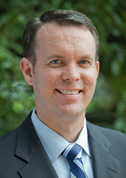© 2014 The Texas Lawbook.
By Jeff Bounds – (August 5) – Students at Southern Methodist University’s Dedman School of Law will have a chance this fall to provide free legal services to start-up companies and individual inventors in obtaining patents and trademarks.
That will be through the Dedman School’s recent selection to be part of a law school clinic certification pilot program that the U.S. Patent and Trademark Office is running.
The USPTO, which opened a Dallas branch office in the past year and a half or so, has more than 40 law schools nationwide participating, according to the agency’s web site.
Also participating from Texas are Houston’s South Texas College of Law and Fort Worth’s Texas A&M University School of Law, according to the USPTO’s website.
David O. Taylor, an assistant professor of law at the Dedman School who teaches patent and intellectual property law, says the school will have two clinics, one dedicated to patents, the other to trademarks.

Photo Courtesy of SMU Dedman
Students “will learn how to work with inventors to identify patentable subject matter, understand new technologies, and learn to apply their substantive knowledge onto the real world process of drafting and filing applications,” he said.
On the patent side, students who have strong backgrounds in technical subjects, such as bachelor’s degrees in engineering, will work with inventors to identify technology that might be patentable. The students will also help clients file patent applications at the USPTO, including responding to letters or other correspondence related to those applications.
A supervising attorney will oversee the students’ work with patent clients, Taylor says. A separate supervising attorney will watch over the work that students do with trademark clients, he added.
All students who participate in the patent clinics must have taken and passed classwork on intellectual property or patents, Taylor said. They must have also passed a course on patent prosecution, he added.
At this point, the patent clinic has at least two slots for students scheduled for the fall semester, although Taylor says that number is subject to increase. “We’re trying to make the clinic available to as many students as reasonably possible,” he says.
Although the legal services that clients receive are free, clientele may have certain legal expenses to cover, such as filing fees with the USPTO.
Taylor notes that the clinics will be seeking to develop relationships with North Texas technology incubators and accelerators as a means of finding inventors who might have good ideas worth getting trademarks or patents on.
“This is an exciting time to be in Dallas and at SMU,” he said.
© 2014 The Texas Lawbook. Content of The Texas Lawbook is controlled and protected by specific licensing agreements with our subscribers and under federal copyright laws. Any distribution of this content without the consent of The Texas Lawbook is prohibited.
If you see any inaccuracy in any article in The Texas Lawbook, please contact us. Our goal is content that is 100% true and accurate. Thank you.
